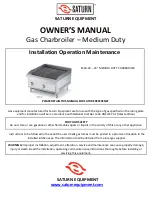
R
ADIANT
B
ROILER
OWNER’S MANUAL 1199797 REV 0 (6/14)
PAGE 14
OF 40
I
NSTALLATION
CAUTION
ALL PIPE JOINTS AND CONNECTIONS MUST BE TESTED THOROUGHLY FOR GAS LEAKS. USE ONLY SOAPY
WATER FOR TESTING ON ALL GASES. NEVER USE AN OPEN FLAME TO CHECK FOR GAS LEAKS. ALL
CONNECTIONS MUST BE CHECKED FOR LEAKS AFTER THE EQUIPMENT HAS BEEN PUT INTO OPERATION.
TEST PRESSURE SHOULD NOT EXCEED 1/2 psi (3.45 kpa) or 35 mbar (14” W.C.).
S
TEP
8
:
C
HECK
T
HE
I
NSTALLATION
1. Check that all screws and bolts are tightened.
2. Check electrical connection(s).
3. Check gas connection(s).
4. Move the appliance into the final position at which it will be operated.
5. Check that the appliance is level. If not, adjust the legs or casters.
6. Check that the appropriate minimum clearances are satisfied (see page 5).
7. Check that there is sufficient clearance to fully open all doors and pull-out all broiler grid(s) and drippings drawer(s).
8. Check that adequate ventilation (fresh air supply and hood exhaust) is available.
9. Wipe clean all cooking surfaces.
10. Check that nothing is obstructing the air intake openings and/or the combustion-exhaust openings.
S
TEP
9
:
C
HECK
B
ROILER
O
PERATION
1. Turn gas supply on. Immediately check all gas connections for leaks using soapy water.
2. Light all pilots (see Operation section). Check all pilots for correct flame height.
3. Turn on each of the four broiler burners one at a time and check for correct flame appearance and height at both the
LOW and HIGH settings.
4. Turn all four broiler burners to the HIGH setting at the same time and check for correct flame appearance and height.
5. Turn-off all burners and allow the broiler to cool.
S
TEP
10
:
S
HUT-
D
OWN AND
W
IPE-
C
LEAN
1. Wipe clean all surfaces.
2. Unless the broiler is to be placed in service immediately, shut off the gas and electricity supplies.
3. Make sure that a copy of this manual will be available to the people who will operate and maintain the broiler.
If applicable, the vent line from the gas pressure regulator shall be installed to the outdoors in accordance with local
codes, or in the absence of local codes, with the National Fuel Gas Code, ANSI Z223.1, Natural Gas Installation Code,
CAN/CGA-B149.1, or the Propane Installation Code CAN/CGA-B149.2, as applicable.
An adequate gas supply is imperative. Undersized or low pressure lines will restrict the volume of gas required for
satisfactory performance. Fluctuations of more than 25% on natural gas or 10% on propane gas will create problems and
affect burner operating characteristics. A 1/8” pressure tap is located on the manifold to measure the manifold pressure.
The supply line to the unit should be no smaller than the inside diameter of the pipe on the equipment to which it is
connected.















































